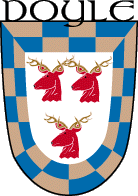|
 The modern English language version of
"Dubh-Ghaill" in Ireland today is "Doyle", "O’Doyle"
or "Dowell", "McDowell", and in Scotland it is
"Dougall" or "MacDougall" (the modern Scots
pronunciation is closer to the original Gaelic). In Ulster and
Roscommon, these names now exist as "McDowell" and
"Dowell", and are carried on by the descendants of the
original immigrant Irish/Scots/Norse Galloglass mercenaries.A
more complete list of surname varients include all the following:
Dougall, Dowell, Doyle, O'Doyle, DubhGhaill, MacDowall, MacDowell,
McDougal, McDougall, McDoughall, McDowall, McDowel, McDowell. The modern English language version of
"Dubh-Ghaill" in Ireland today is "Doyle", "O’Doyle"
or "Dowell", "McDowell", and in Scotland it is
"Dougall" or "MacDougall" (the modern Scots
pronunciation is closer to the original Gaelic). In Ulster and
Roscommon, these names now exist as "McDowell" and
"Dowell", and are carried on by the descendants of the
original immigrant Irish/Scots/Norse Galloglass mercenaries.A
more complete list of surname varients include all the following:
Dougall, Dowell, Doyle, O'Doyle, DubhGhaill, MacDowall, MacDowell,
McDougal, McDougall, McDoughall, McDowall, McDowel, McDowell.
As early as 851 AD one DubhGilla, son of
Broder, is mentioned as king of Idrone in County Carlow. From this time
onwards, it is an interesting exercise to trace the development of the
name in the calendars of Irish records. We instance the following as
examples:- O Dowill, Dowyll, O Dowile, O Doule, O Douell, Duggal,
McDuggal, McDowell, Dowell, McDowall and Dowall. All are clearly forms
of "dubh-ghaill" mentioned above.
The
McDowell family in Ireland are “cousins”, and are descended from the
Danish Vikings who settled in Argyll and the Western Islands of
Scotland. Their great
ancestor was Somerled (a Viking word meaning “summer warrior”) , he
was the master of Argyll (on the west coast of Scotland) and he was
killed in battle against the Scots in 1164.
(Argyll and the Western Isles were not ceeded to Scotland by the
King of Norway until 1266.) A
branch of this family settled in Ireland in the 1240’s.
Initially they served as “galloglass” (professional mercenary
soldiers) for the O’Conor Clans in the Province of Connacht.
For the next 300 years or so, the McDowells are recorded in
various ancient Irish records as professional soldiers, serving a number
of different Irish Warlords in various parts of Ireland.
|

|

